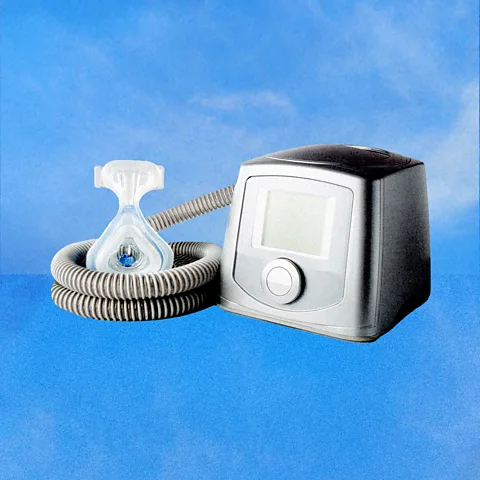Over time, we’ve gained an increasing understanding of nose breathing’s physical benefits, but the connection between the nose and the brain is often overlooked. In my case, the simple act of breathing through my nose brought a variety of bodily relief, but the way we breathe, particularly through the nose, can have a surprising impact on our psychological wellbeing.
 Serenity Strull/ BBC
Serenity Strull/ BBCYou can think of the nose like a wind chime for the mind; when air moves through your nose, it seems to have a significant influence on your cognitive processes. Nasal breathing has positive effects on the limbic system – the parts of the brain that regulate emotion and behaviour – in ways that mouth breathing doesn’t.
Some research indicates that rhythmic, drawn-out nasal breathing slows down brain waves across your entire cerebral cortex, indicating a calmer state of mind
A 2023 study, for example, found that nose breathing lowers blood pressure and the variability and frequency of the heart rate, indicating relaxation. “It’s not going to treat hypertension [high blood pressure],” says Joe Watso, an applied physiologist at Florida State University, who led the study. “But breathing in and out through your nose seems to have a calming effect on your nervous system.” Studies have even shown that breathing through your nose improves performance on spatial tasks, enhances memory function and betters your reaction time.
Experts don’t know exactly why that is. What we do know is breathing through your nose triggers the olfactory nerve – the nerves responsible for detecting odours – apparently even when there’s nothing to smell. A leading theory is that this synchonises electrical activity across different areas of the brain including the amygdala and the hippocampus. Whatever the cause, nose breathing appears to activate the parasympathetic nervous system, which helps the body to conserve energy and slows down bodily functions when you’re relaxed.
Science is telling us what meditators and yoga practitioners have said for thousands of years: nose breathing can help with mental wellbeing. Some research indicates that rhythmic, drawn-out nasal breathing slows down brain waves across your entire cerebral cortex, indicating a calmer state of mind. Watso and others suggests nasal stimulation could even offer a physiological explanation for the benefits of meditating.
Almost every part of my life has improved in the months since I got my nose fixed. That includes my mental health. My anxiety has lessened, I’m more able to focus and my mood is better overall. It may be no coincidence. Callander says nose breathing could actually be making me a calmer guy.